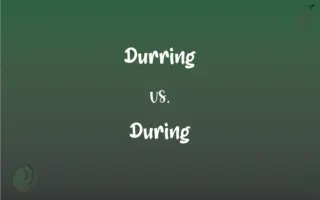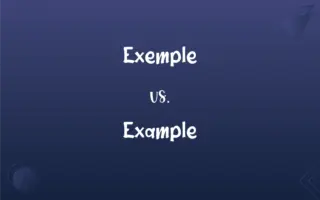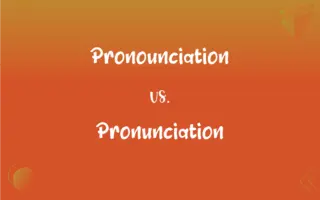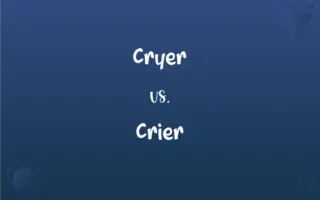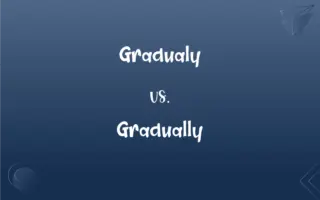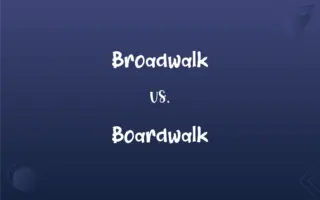Interessting vs. Interesting: Mastering the Correct Spelling
Edited by Aimie Carlson || By Janet White || Updated on March 11, 2024
"Interessting" is an incorrect spelling; the proper form is "Interesting," which means attracting or holding attention.

Which is correct: Interessting or Interesting
How to spell Interesting?

Interessting is Incorrect

Interesting is Correct
ADVERTISEMENT
Key Differences
Connect it with "interest" - an 'interesting' thing holds 'interest,' which also has one 'S.'
Associate it with “enter” – interesting things might allow you to "enter" into engaging topics or conversations, and "enter" has one 'T.'
Memorize the common suffix “-ing” following “interest.”
Remember the sequence: one 'I,' two 'N's, one 'T,' two 'E's, one 'R,' one 'S,' one 'T,' and ending with 'ING.'
Think about "resting" - "inteRESTING" contains the word "resting" which is spelled with one 'S.'
ADVERTISEMENT
Correct usage of Interesting
The book offers an interessting perspective on ancient civilizations.
The book offers an interesting perspective on ancient civilizations.
My brother thinks science is more interessting than history.
My brother thinks science is more interesting than history.
She found the lecture very interessting, despite its length.
She found the lecture very interesting, despite its length.
It was an interessting choice to paint the room bright yellow.
It was an interesting choice to paint the room bright yellow.
Interesting Definitions
It implies that something is not dull or boring
He always shares interesting facts.
Interesting refers to something that holds attention through being engaging
The documentary was incredibly interesting.
Interesting denotes the quality of arousing curiosity
She has an interesting perspective on the matter.
Interesting might mean appealing or evoking attention positively
The novel presented an interesting dilemma.
It signifies that something is noteworthy or holding significance
It's an interesting development in the case.
Arousing or holding the attention; absorbing.
(obsolete) Of concern; affecting, important.
Arousing or holding the attention or interest of someone.
(euphemistic) Pregnant.
Present participle of interest
Engaging the attention; exciting, or adapted to excite, interest, curiosity, or emotion; as, an interesting story; interesting news.
Arousing or holding the attention
Interesting Sentences
The story she told was really interesting and full of mystery.
He has an interesting idea for our science project.
The museum had many interesting exhibits on dinosaurs.
The documentary about space was incredibly interesting.
I read an interesting article about renewable energy sources.
I found an interesting rock in the garden.
She made an interesting discovery while researching her family tree.
The guest speaker has an interesting background in wildlife conservation.
He has a hobby that many people might find interesting: beekeeping.
The chef uses interesting ingredients in his dishes.
The artist's work is interesting because it blends different cultural influences.
The teacher shared some interesting facts about the rainforest.
Our guide told us interesting stories about the history of the castle.
Learning how airplanes are built was interesting to me.
During our trip, we visited an interesting small village known for its craftsmanship.
The movie had an interesting plot twist that I didn't see coming.
The game has an interesting mechanism for players to explore.
They are doing interesting research on how plants communicate.
My friend recommended an interesting book about ancient Egypt.
She has an interesting way of solving problems.
The debate was interesting, with many viewpoints discussed.
I think ancient languages are interesting to study.
The lecture on marine biology was interesting and informative.
The puzzle was interesting and challenging at the same time.
The scientist presented interesting findings on the behavior of octopuses.
FAQs
Which vowel is used before Interesting?
Either "a" or "an," depending on usage.
What is the pronunciation of Interesting?
/ˈɪntrəstɪŋ/.
Why is it called Interesting?
Derived from the verb "interest" implying attention or curiosity is held.
What is the singular form of Interesting?
Interesting.
Which preposition is used with Interesting?
"in" as in "interesting in some aspects."
What is the root word of Interesting?
"Interest."
Is Interesting an abstract noun?
No.
Is Interesting a noun or adjective?
Adjective.
What is the verb form of Interesting?
"Interest."
Is Interesting a negative or positive word?
Generally positive.
What is the plural form of Interesting?
Interesting has no plural form as it is an adjective.
Is Interesting a vowel or consonant?
It is a word, not a vowel or consonant.
Which conjunction is used with Interesting?
No specific conjunction is dedicated to it.
Is Interesting a countable noun?
It is not a noun; it's an adjective.
Is Interesting a collective noun?
No.
Is the Interesting term a metaphor?
No.
What is a stressed syllable in Interesting?
The first syllable "In" is stressed.
Which determiner is used with Interesting?
Can use "this" or "that" depending on the context.
What is the third form of Interesting?
"Interested" (past participle).
Which article is used with Interesting?
"An" usually. (e.g., an interesting book).
Is the word Interesting imperative?
No.
How do we divide Interesting into syllables?
In-ter-est-ing.
What is the opposite of Interesting?
"Boring."
Is Interesting an adverb?
No.
How many syllables are in Interesting?
Four syllables.
What is another term for Interesting?
"Engaging."
What is the first form of Interesting?
"Interest" (verb form).
How is Interesting used in a sentence?
"The lecture was surprisingly interesting and insightful."
What part of speech is Interesting?
Adjective.
What is the second form of Interesting?
"Interested" (past or adjective form).
About Author
Written by
Janet WhiteJanet White has been an esteemed writer and blogger for Difference Wiki. Holding a Master's degree in Science and Medical Journalism from the prestigious Boston University, she has consistently demonstrated her expertise and passion for her field. When she's not immersed in her work, Janet relishes her time exercising, delving into a good book, and cherishing moments with friends and family.
Edited by
Aimie CarlsonAimie Carlson, holding a master's degree in English literature, is a fervent English language enthusiast. She lends her writing talents to Difference Wiki, a prominent website that specializes in comparisons, offering readers insightful analyses that both captivate and inform.

